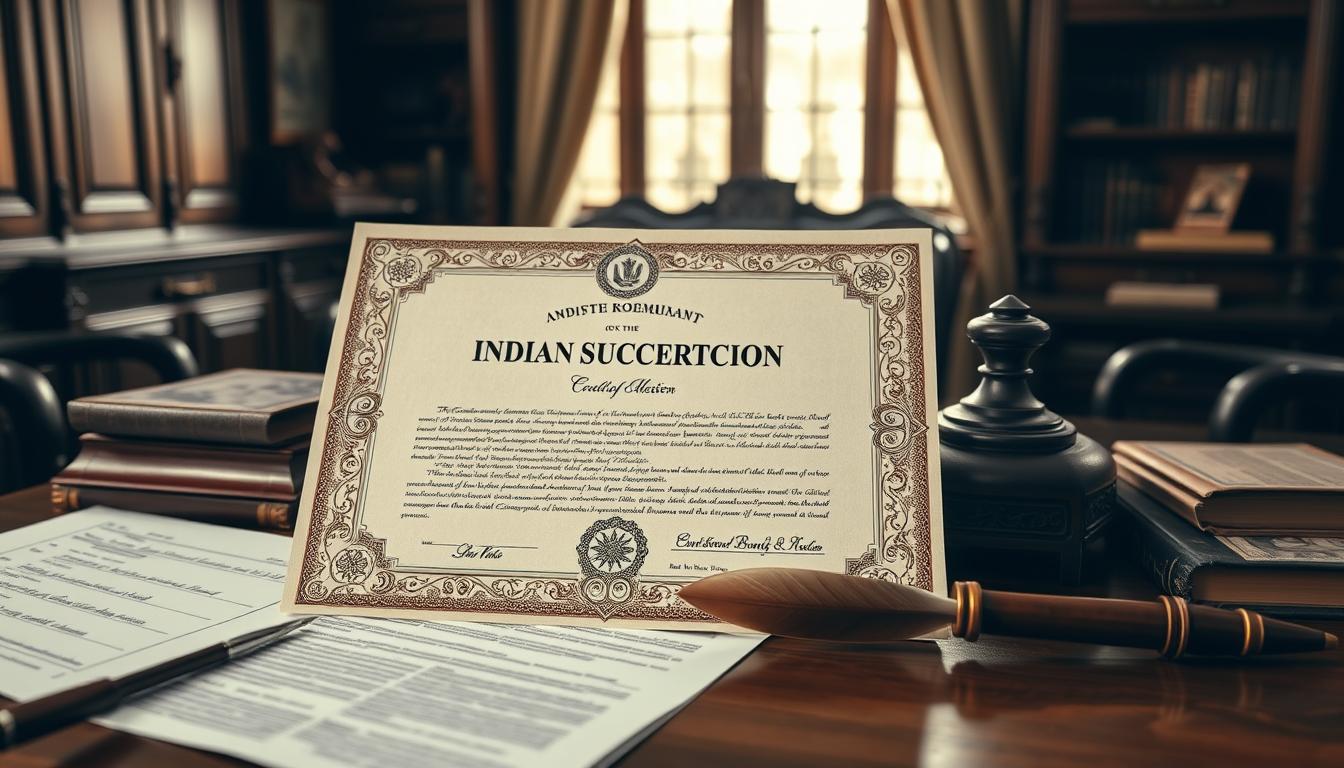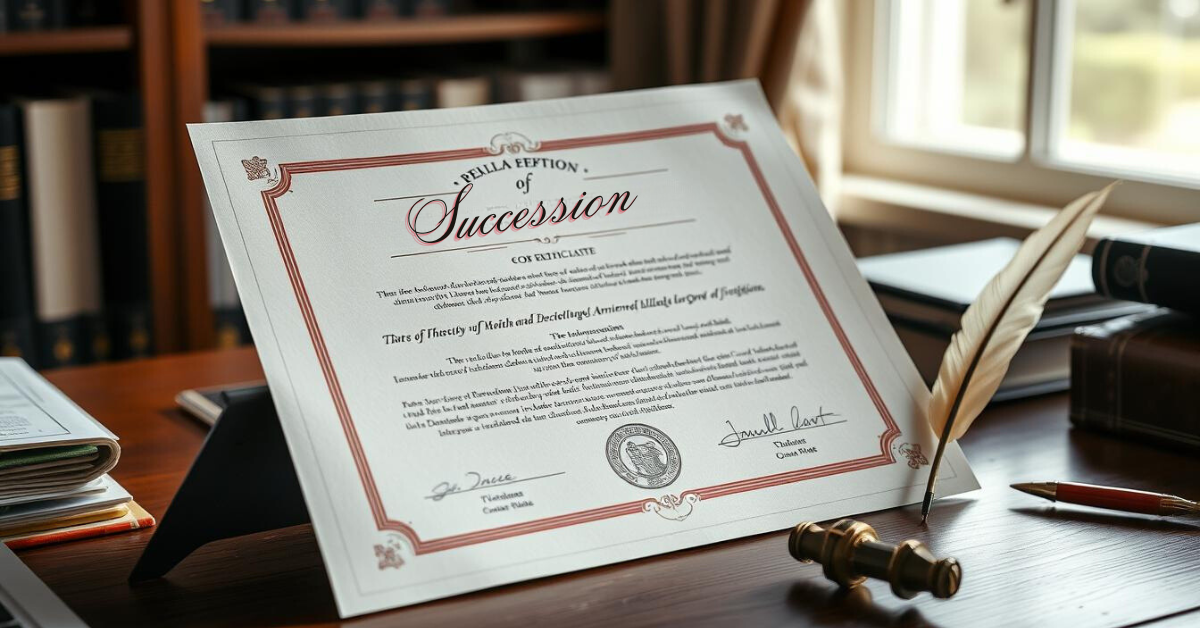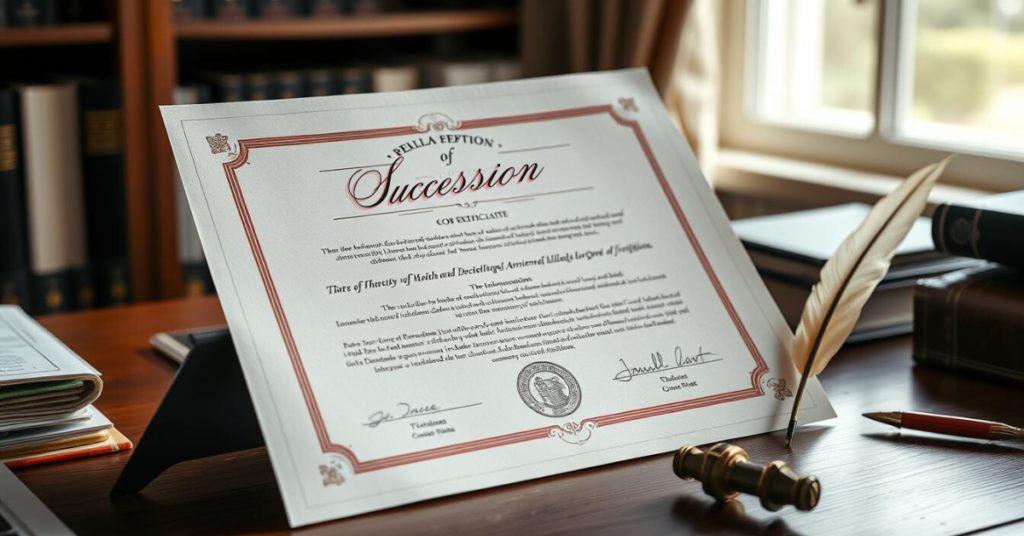Inheriting property or assets in India can be complex. But getting a succession certificate is key to a smooth transfer. This guide explains what a succession certificate is, why it matters, who can get one, and what documents you need. It also walks you through how to get this important legal document.

Table of Contents
ToggleKey Takeaways
- A succession certificate proves who should get a deceased person’s assets and property in India.
- It’s vital to get a succession certificate to claim your inheritance and manage the deceased’s assets and debts.
- To be eligible, you must be related to the deceased, part of their family, and the property type matters too.
- Knowing the documents needed and the application process is crucial for getting a succession certificate.
- In some cases, you might use a will and probate or a letter of administration instead of a succession certificate.
Understanding Succession Certificate in India
A succession certificate in India is a key legal document. It shows who the rightful heirs of a deceased person are and their share in the deceased’s assets. This certificate, given by the court, proves the heir’s right to manage and share the deceased’s estate.
What is a Succession Certificate?
The succession certificate is vital for claiming inheritance rights in India. It lets heirs manage the deceased’s movable properties, like bank accounts and investments. Without it, heirs might struggle to get their share of the deceased’s estate.
Importance of a Succession Certificate
- Establishes the rightful heirs and their share in the deceased’s assets
- Grants the heirs the authority to manage and distribute the deceased’s estate
- Facilitates the transfer of the deceased’s movable properties to the rightful heirs
- Succession certificate is not required for immovable property in India
The succession certificate is crucial for a smooth and legal transfer of assets to heirs. It’s a must-have for anyone wanting to claim their inheritance in India.
“The succession certificate is the key to unlocking the deceased’s estate and ensuring a fair distribution of their assets.”

Eligibility Criteria for Obtaining a Succession Certificate
To get a succession certificate in India, you must be a legal heir of the person who passed away. This includes spouses, children, parents, and other close relatives. The rules can change based on the deceased’s religion, if they were married, and if they left a will.
Here are the main things you need to qualify for a succession certificate in India:
- Relationship to the Deceased: You must be a legal heir, like a spouse, child, parent, or close relative, based on the person’s personal law.
- Proof of Relationship: You need to show documents that prove your connection to the deceased. This could be birth certificates, marriage certificates, or adoption papers.
- No Existing Will: If the deceased had a valid will, you might not need a succession certificate. The will would decide how their assets are shared.
- Residency Status: The person who passed away must have lived in the state or territory where you’re applying for the certificate.
Remember, the rules can differ based on personal laws and the situation with the deceased’s assets and family. Talking to a lawyer can make sure your application goes smoothly.
“The succession certificate is a crucial document that ensures the rightful transfer of the deceased’s assets to their legal heirs.”
Required Documents for Succession Certificate
To get a succession certificate in India, you need to submit many documents. The main documents are required for all cases. But, you might need more based on your situation.
List of Essential Documents
- Death certificate of the deceased
- Proof of the applicant’s relationship to the deceased
- Details of the deceased’s assets, including immovable properties, bank accounts, investments, and other financial holdings
Additional Documents Based on Circumstances
Depending on your case, you might need more documents. Here are some examples:
- If the deceased left a will, a copy of the will and the probate (if obtained)
- If the deceased did not leave a will, documents establishing the legal heirs
- If the deceased owned any immovable property, documents related to the ownership and possession of the property
- If the deceased had any outstanding loans or debts, documents related to the same
- Any other relevant documents that may be requested by the authorities to establish the succession rights
The documents needed can change based on where you are. It’s smart to talk to a lawyer or the right people. They can help make sure you have everything needed for your succession certificate.
“Obtaining a succession certificate in India can be a complex process, but with the right documentation and guidance, it can be navigated effectively.”
succession certificate in india
In India, the Indian Succession Act, 1925, governs getting a succession certificate. This law sets out the legal steps and rules for applying and getting one. It makes sure the deceased’s assets go to the right heirs smoothly.
The succession certificate is a legal document. It lets the holder manage and collect the deceased’s assets. It’s key for those who need to get to the deceased’s money, properties, or other things.
- The succession certificate in India proves who has the right to inherit the deceased’s assets.
- It’s needed to handle the deceased’s bank accounts, investments, real estate, and other assets.
- The court where the deceased lived last issues the succession certificate.
“The succession certificate in India is a vital document that ensures the rightful transfer of a deceased person’s assets to their legal heirs.”
Getting a succession certificate in India can be tricky. But, it’s crucial for the right distribution of the deceased’s estate. Knowing the legal steps helps people go through the process well. This ensures the deceased’s assets go to the right people.
Process of Obtaining a Succession Certificate
Getting a succession certificate in India is easy. It makes sure the right person gets the assets and property. Knowing the steps can make it easier.
Step-by-Step Guide
Here’s how to get a succession certificate in India:
- File an Application: Start by filing an application at the District Court or Civil Court where the deceased lived.
- Gather Required Documents: Collect the needed documents. These include the death certificate, a list of the deceased’s assets, and ID proofs of the applicant.
- Pay the Applicable Fees: Pay the court fees for the application. The fees depend on the jurisdiction and the estate’s value.
- Attend Court Hearings: Be ready for court hearings. The judge will check the application and documents.
- Receive the Succession Certificate: After everything is done, the court will give you the succession certificate. It lets you manage and distribute the deceased’s assets.
Understanding the succession certificate in India process is key. By following these steps, you can smoothly transfer your inheritance.
“The succession certificate is a powerful legal instrument that helps safeguard the inheritance rights of the deceased’s beneficiaries.”
Jurisdiction for Succession Certificate
Getting a succession certificate in India is complex. Knowing the jurisdiction rules is key. The place where the deceased’s assets are located decides the jurisdiction, not where they lived.
To apply for a succession certificate, you must file in the right court. This court is either the district court or the high court where the deceased lived or where most of their assets are. This makes the legal process smoother and faster.
- The district court or high court with jurisdiction over the deceased’s place of residence
- The district court or high court with jurisdiction over the location where the majority of the deceased’s assets are situated
Choosing the right court is vital. Applying in the wrong one can cause delays and problems. A legal expert can guide you through this to ensure a successful application.
“Understanding the jurisdictional requirements is crucial for ensuring a smooth and successful application process for a succession certificate in India.”
Following the jurisdiction rules helps make getting a succession certificate easier. This important document helps transfer assets and property after someone passes away.
Succession Certificate for Immovable Property
In India, you don’t always need a succession certificate to transfer land or real estate after someone dies. The rules for immovable property are different from those for movable assets. In some cases, heirs can go straight to the authorities to claim their inheritance without a succession certificate.
Regulations and Procedures
Getting inheritance for immovable property is often easier than for movable assets. The succession certificate not required for immovable property rule helps many heirs. They can take possession of the property without needing a formal succession certificate.
But, the rules and steps can change based on where the property is and its type. Important things to consider include:
- The state or local laws for transferring immovable property
- The type of property (e.g., residential, commercial, agricultural)
- The ownership structure (e.g., joint ownership, sole ownership)
- The legal status of the property (e.g., registered, unregistered)
Heirs can usually go to the land revenue department or the registration office to start the transfer process. They need to bring documents like the deceased’s death certificate, proof of identity and relationship, and other required papers.
“The regulations and procedures for dealing with immovable property may differ from those for movable assets, and in some cases, the heirs can directly approach the relevant authorities to claim their inheritance rights without the need for a succession certificate.”
It’s wise to talk to legal experts or the right authorities to know what you need. Remember, succession certificate not required for immovable property doesn’t always apply.
Contesting a Succession Certificate
In India, sometimes people contest a succession certificate if they think they should get the deceased’s assets. To contest, they file an objection with the court. They need to show evidence and go to court to prove their claim is right.
It’s important to know how to contest a succession certificate to make sure the estate is divided fairly. Here are some key points:
- Grounds for Contesting: Reasons to contest include disagreements over the will, claims of adoption, or fraud in the application.
- Filing an Objection: To contest, claimants must file an objection with the court that issued the certificate, usually within a certain time.
- Providing Evidence: They must show strong evidence and witness statements to support their claim and challenge the current succession certificate.
- Legal Proceedings: The court will then listen to all sides and look at the evidence before deciding on the succession certificate.
“Contesting a succession certificate can be a complex legal process, but it’s important to ensure that the deceased’s estate is distributed fairly and according to the law.”
Understanding how to contest a succession certificate in India helps protect your rights. It ensures the deceased’s assets are divided correctly.
Alternatives to Succession Certificate
A succession certificate is often used to claim inheritance in India. But, there are other options that might work better in some cases. These include a will and its probate, and a letter of administration.
Will and Probate
A will is a document that states how someone wants their assets to be shared after they die. If someone dies with a valid will, their heirs can get the probate of the will. This means the court checks the will and lets the executor share out the property as the will says.
This can be a good choice instead of a succession certificate. It’s especially useful if the deceased clearly said who should get their property.
Letter of Administration
A letter of administration is a court document that lets someone, often a relative, handle and share out the deceased’s estate. It’s a good option when there’s no valid will or when a succession certificate isn’t needed for property. The person named in the letter can manage the deceased’s assets and make sure they go to the right people.
In short, while succession certificates are common for inheritance claims in India, succession certificate not required for immovable property can be gotten in other ways. This includes a will and its probate, or a letter of administration, depending on the situation.
Conclusion
Getting a succession certificate in India is key to claiming inheritance rights. This guide has covered the legal needs, steps, and why it’s important. It helps readers understand the process well, ensuring the estate goes to the right heirs smoothly.
The article talked about what a succession certificate is, why it matters, who can get one, and what documents are needed. It also explained the steps, where to get it, and rules for property. With this info, people can make smart choices and handle their inheritance duties well.
The succession certificate is crucial for the legal rights of the deceased’s family. It ensures their assets are divided fairly. By following this guide, readers can handle the succession certificate process in India. This protects their loved ones’ inheritance.
FAQ
What is a Succession Certificate?
A Succession Certificate in India proves who the rightful heirs of a deceased person are. It shows their share in the deceased’s assets. It’s given by a court and proves the heir’s right to manage and share the estate.
Why is a Succession Certificate important?
The Succession Certificate is key for claiming inheritance rights. It lets heirs manage the deceased’s movable properties. This includes bank accounts, investments, and other financial assets.
Who is eligible to apply for a Succession Certificate?
To get a Succession Certificate in India, you must be a legal heir. This includes the spouse, children, parents, and close relatives. It depends on the personal laws that apply.
What documents are required to obtain a Succession Certificate?
To get a Succession Certificate, you need to submit several documents. These include the deceased’s death certificate and proof of your relationship to them. You also need details of the deceased’s assets. More documents might be needed based on the situation.
Is a Succession Certificate required for the transfer of immovable property?
In India, a Succession Certificate isn’t always needed for immovable property. This includes land or real estate. The rules for immovable property can be different from those for movable assets.
Can a Succession Certificate be contested?
Yes, a Succession Certificate can be challenged by others who think they should get the assets. To contest it, you file an objection with the court. You need to provide evidence and go through legal proceedings.
What are the alternatives to a Succession Certificate?
While a Succession Certificate is common for claiming inheritance in India, there are other options. These include a will and its probate, or a letter of administration. These might be better in some cases, especially if there’s a valid will or for immovable property.

